The Greatest TV Cops of All Time

It’s probably fitting to start this story with just the facts (ma’am). Since the original golden age of television in the 1960s, the viewing experience has wildly changed. Any episode can be queued up with the click of a button. Breathless dramas unspool like mini movies. Bingeing is a hobby. Yet one staple has managed to endure: Our love of TV cops. “A lot of people turn to TV for comfort, and there’s nothing more comfortable on TV than watching somebody close a case in an hour,” says TV Guide critic Matt Roush. “We love seeing somebody great at their jobs who can bring order to our lives.”
The crime-solving character dates back all the way to Inspector Holt (played by J.B. Rowe) in the BBC crime show Telecrime in 1938 (later Telecrimes, in 1946), which was followed stateside by Gene O’Donnell’s Barney Blake, Police Reporter on NBC in 1948. Since then, fans have watched hundreds of badge-wearing detectives collar the bad guy(s) while dealing with their own personal dramas. They’re humans and heroes, sometimes ready for a quip and a catchphrase. “The best TV cops,” Roush says, “linger in our memories because of their personalities.”
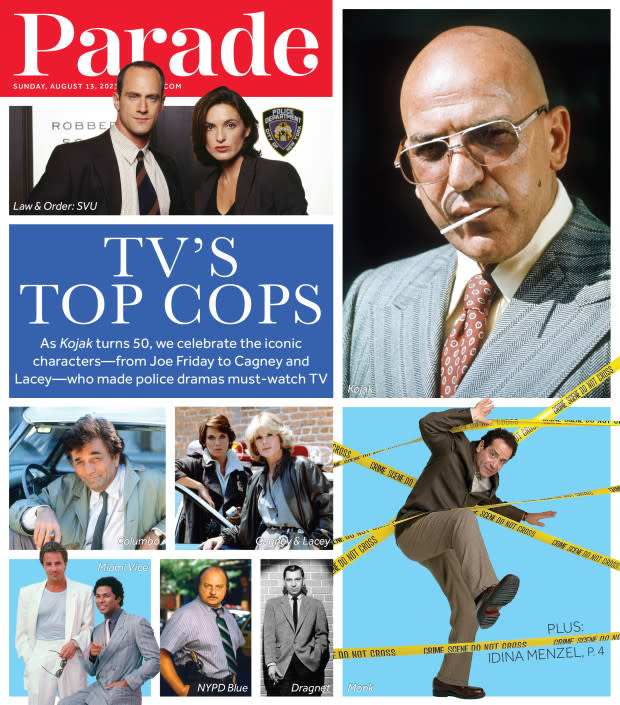
Parade Magazine
To celebrate the 50th anniversary of TV’s most famous brash-and-bald detective—more on that below, baby—here’s our salute to ten of the best and the brightest.
The greatest TV cops of all time
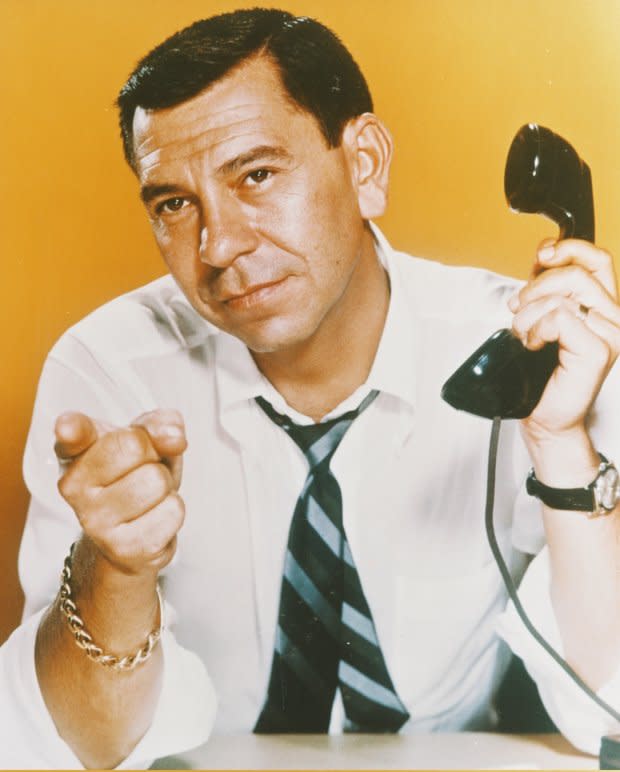
NBC/Getty Images
Joe Friday (Jack Webb)
Dragnet (1951-59; 1967-70, NBC)
Signature style: The by-the-book, hat-and-suit-wearing LAPD sergeant carried out his investigations of check fraud, petty theft, drug abuse, murder and even child abduction with a fast-talking brashness. His famous “just the facts” line was an instruction to eyewitnesses telling their stories. (FYI, the actual line is “Ma’am, we just want to get the facts.”)
Why he ranks: “Joe Friday is baked into our TV DNA because all he wanted to do was a good job and he did it without any soap opera,” Roush says. “He really invented the template of TV law and order,” (long before Law & Order).
Sleuth truth: Webb created Dragnet for NBC radio in 1949 with the goal of using real cases from LAPD police files as well as similar crime-solving methods and technical language. He was so authentic in his portrayal that viewers would go to LAPD police headquarters and ask to see him. The show was also popular among police officers: Upon Webb’s death in 1982, Friday’s badge No. 714 was retired. (Streaming on YouTube, Amazon Prime Video)
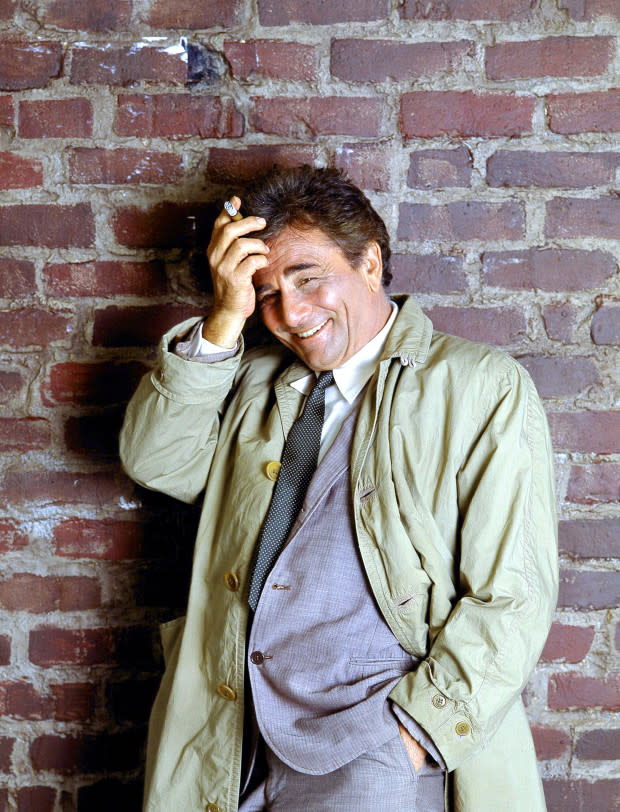
Getty Images
Columbo (Peter Falk)
Columbo (1968, 1971-77, NBC); (1989-2003, ABC)
Signature style: No hard-boiled tough guy, this New York lieutenant—his first name was never officially identified, though “Frank Columbo” was visible on his badge—was a disheveled, trench coat-wearing detective who behaved like he was more interested in the Soup of the Day at the corner deli than cornering the killer. But his unassuming personality proved to be his secret weapon: Just when the criminals thought that they’d gotten away with murder, Columbo would ask, “Just one more thing . . . ” and nail ‘em.
Why he ranks: “He’s a very average guy,” Falk once explained. “But what sets him apart is that he’s really curious. He’s got eyes like an eagle and sees things and smells things differently and that quality makes him different from you and me and everybody. And he didn’t care that people thought he was average.” Knives Out director Rian Johnson has cited Columbo as inspiration for Poker Face, his popular show starring Natasha Lyonne about an average gal who just happens to be a human lie detector.
Sleuth truth: Falk, who died in 2011, also noted that “I’d like to think that Columbo was a reflection of my personal taste.” To wit, the character’s signature rumpled raincoat came from Falk’s own closet: “I just felt comfortable in it.” (Streaming on Peacock, Amazon Prime Video)
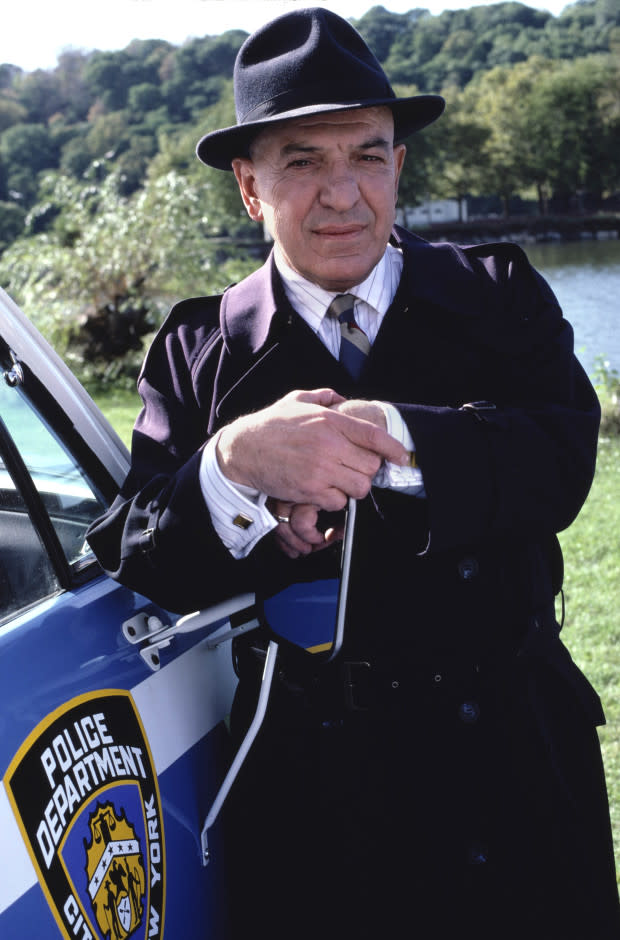
CBS Photo Archive/Getty Images
Theo Kojak (Telly Savalas)
Kojak (1973-78, CBS)
Signature style: So smooth. So cultured. So bald. The lollipop-sucking “Who loves ya, baby?”-spouting lieutenant strolled through the gritty streets of New York City with a distinct suaveness as he played both good cop and bad cop in his bid to bust the bad guys. (Sure, he’ll bend a few rules to arrest the ringleader of a drug operation.)
Why he ranks: No big deal; he just redefined the cop character in the 1970s. Says Roush, “He was gruff, but there was some warmth to him. He’s like a bridge between Joe Friday and NYPD Blue’s Andy Sipowicz. And his look was so unique—there was something exotic about him.”
Sleuth truth: The Greek actor first shaved his head for the role of Pontius Pilate in the 1965 epic The Greatest Story Ever Told. He liked the shiny look so much that he decided to keep it in perpetuity. As for the candy? It first popped up in Kojak’s eighth episode, “Dark Sunday.” Kojak explains to Kevin Dobson’s Det. Bobby Crocker that he’s taking a liking to the licking to close the generation gap. He really used it as a replacement for cigarettes. (Streaming on Amazon Prime Video, YouTube)
Related: Want to Crack the Case? These Are The 101 Best Mystery Books of All Time
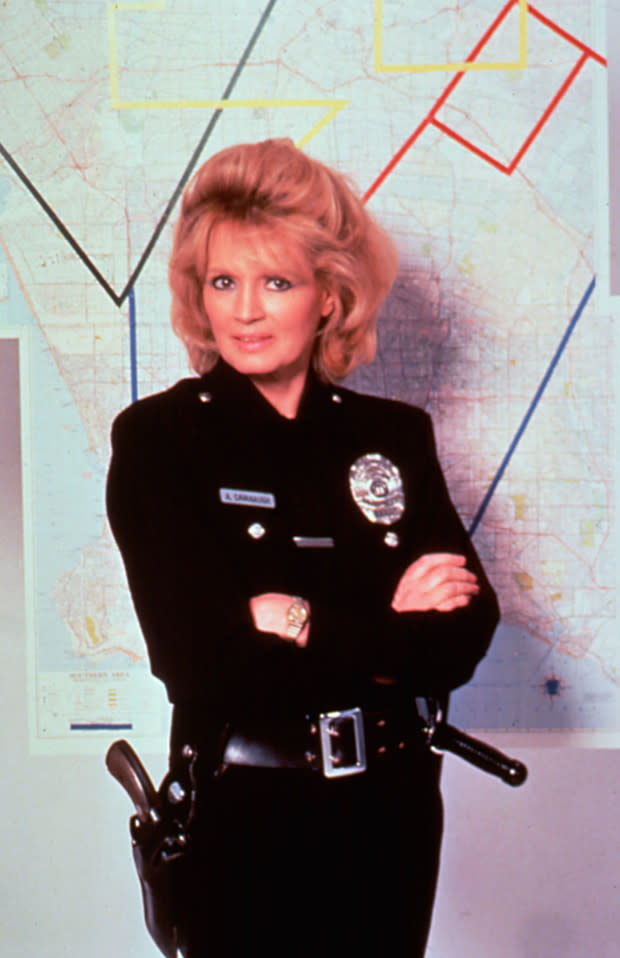
NBC
Suzanne “Pepper” Anderson (Angie Dickinson)
Police Woman (1974-78, NBC)
Signature style: The only female detective in her department at the LAPD, she often went on dangerous undercover missions and took on many investigations geared toward women—including rape and prostitution rings. Creator Robert L. Collins devised the character as part of the season-one finale of the series Police Story. Dickinson was 43 when she filmed the pilot.
Why she ranks: Before Charlie’s Angels and Olivia Benson, Dickinson’s character was armed and ready to fight criminals with a distinct feminine flair. “Pepper broke the glass ceiling in a lot of ways because you didn’t see a lot of women in the genre,” Roush says. “But she led her agenda with her sexuality.”
Sleuth truth: Indeed, the detective was constantly complimented on her good looks and went undercover wearing halter tops, wispy shirts, low-cut dresses and bikinis(!). “If we went too hard and made her too tough, people weren’t going to like that,” Dickinson, 91, said in 2016. “I wasn’t Marilyn Monroe, but I was middle-of-the-road and it worked.” (Streaming on Crackle, Plex)
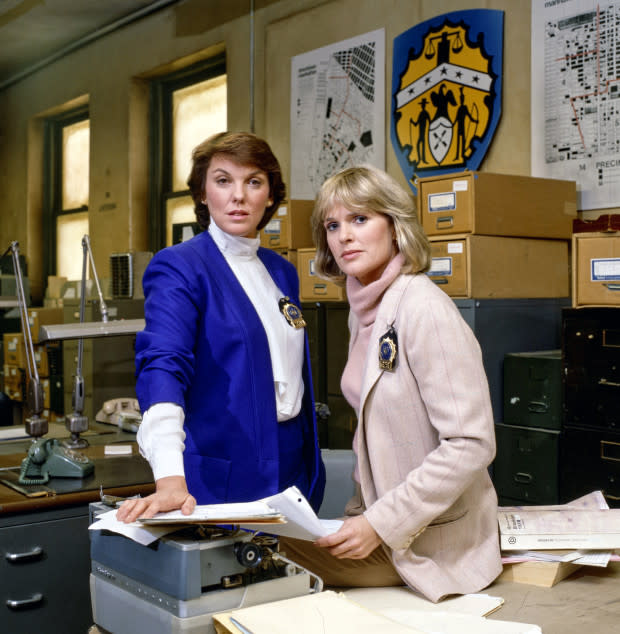
CBS
Christine Cagney and Mary Beth Lacey (Sharon Gless and Tyne Daly)
Cagney & Lacey (1981-88, CBS)
Signature styles: The single Cagney had big career aspirations, while Lacey was happily married with children. No matter; the New York City police officers had each others’ backs in the progressive decade of excess. Their cases covered topics such as abortion, AIDS and date rape.
Why they rank: “It was the first drama ever starring two women,” Gless, 80, told Parade in 2022. “We dealt with cancer, alcoholism and sexual harassment before it was fashionable. And it was the first series with female directors and writers.” Gless proudly adds that she and Daly, 77, recently participated in a women’s march in Washington, D.C. “Women started screaming and clapping and crying. I looked down and said, ‘Oh my god. This is the result of what we did.’”
Sleuth truth: Gless says that CBS often got flack from the NYPD because Cagney never wore her seatbelt. She explains, “Cagney didn’t follow anybody’s rules, so it was written into the script that I wouldn’t do it. I enjoyed that.” (Streaming on Amazon Prime Video, Pluto, The Roku Channel)
Related: Inspire Your Inner Sleuth with the 15 Greatest Murder Mystery Movies of All Time
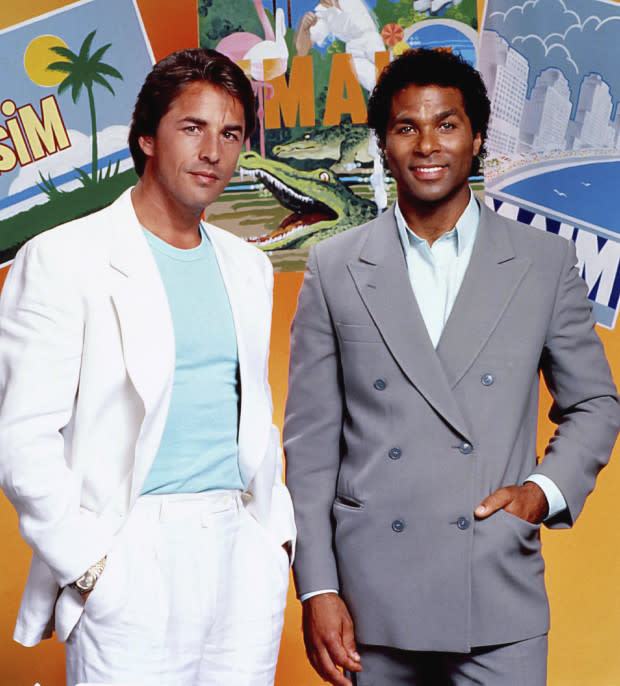
NBC/Getty Image
Sonny Crockett and Rico Tubbs (Don Johnson and Philip Michael Thomas)
Miami Vice (1984-89, NBC)
Signature styles: Simply put, these two undercover cops belonged to the (neon-lit) city. Every week, the partners drove slick cars and steered sleek boats to bust drug gangs, terrorist cells and prostitution rings.
Why they rank: Sure, they were great at their jobs. But Crockett and Tubbs also influenced viewers with their slick fashion sense—a T-shirt under a pastel sports coat! Loafers with no socks!—and flashy lifestyle. (Consider that NBC’s entertainment chief reportedly conceived the show as “MTV cops.”) “They were icons because of their Miami vibes,” Roush says.
Sleuth truth: Producers were hot on Jeff Bridges and Nick Nolte for the role of Crockett, but both passed to focus on their film careers. Johnson, now 73, was also up against Gary Cole (Office Space) and CHiPs alum Larry Wilcox. Nonetheless, the actor quickly became so popular that he was set to exit the show after the second season. Solution: A hefty raise, which made him one of the highest-paid actors of the ‘80s. But Thomas, 74, once told People that he rarely felt overshadowed by his costar: “I liked that Don was getting the publicity. I wanted the mystique. The bigger he got, the bigger we got.” (Streaming on YouTube, Amazon Prime Video, Vudu)
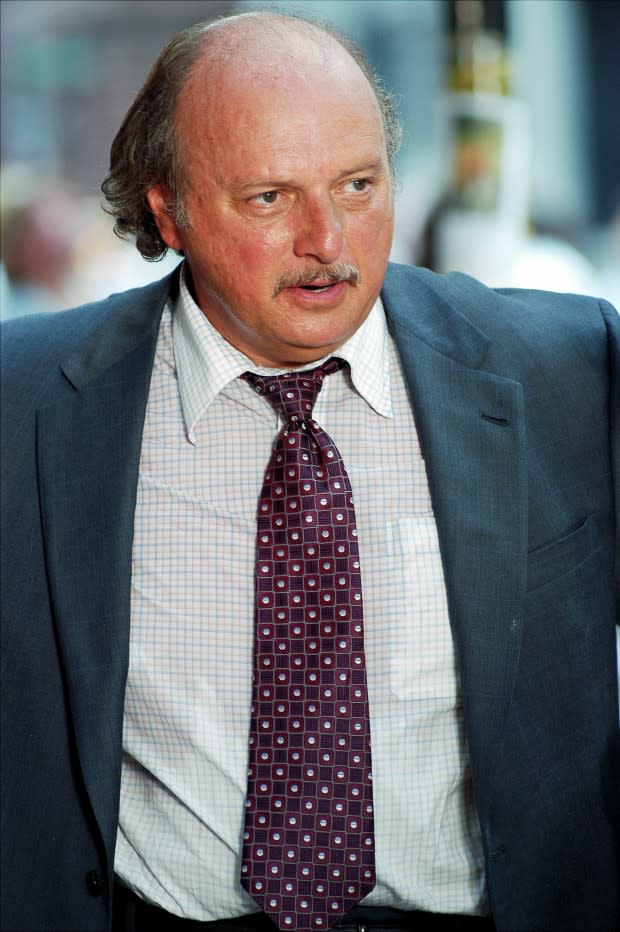
New York Daily News Archive/Getty Images
Andy Sipowicz (Dennis Franz)
NYPD Blue (1993-2005, ABC)
Signature style: Described as a “drunken, racist goon with a heart of gold,” the detective-turned-sergeant of the 15th precinct lost one wife to divorce and another to gunfire, fought prostate cancer and alcoholism and watched two partners and his own namesake son die. But he survived it all with his unflinching, uncompromising attitude.
Why he ranks: In the pantheon of TV greats, he looms large. “Andy set a new standard because nobody had ever seen a detective with more demons,” Roush says. “There was a Shakespearean element to the character because of all the tragedy in his life. But he was not without redemption. And he believed in justice.”
Sleuth truth: Though Franz, now 78, had already played law-enforcement characters in everything from Hill Street Blues to Die Hard 2 prior to being cast, he couldn’t resist the opportunity. “I read the script and was the first guy hired,” he said in 2003. “Even though I was tired of playing cops, I couldn’t pass it up. Plus, the scripts were wonderful. But I didn’t know it would catch on with the audience.” After he won his first of four Emmys for that first season, “I was hooked. I had to stay with it.” Franz ended up as the only cast member to appear in all 261 episodes. (Streaming on Hulu, Amazon Prime)
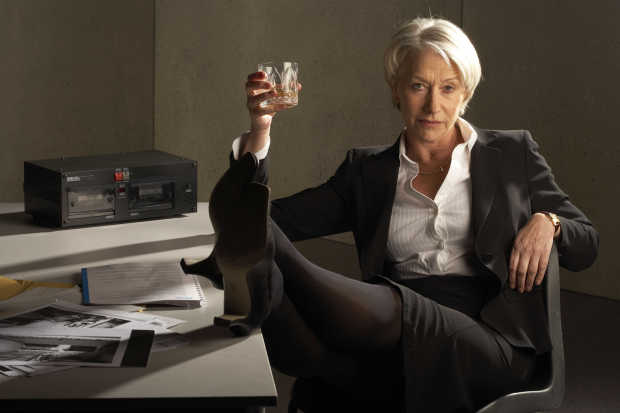
Getty/ITV
Jane Tennison (Helen Mirren)
Prime Suspect (1991-2006, ITV Studios)
Signature style: She was curt, volatile and ultra-ambitious. . . not unlike her male counterparts. And with a drinking problem and a slew of unstable relationships, the detective chief was better at chasing killers than battling her own personal demons. But no doubt Tennison used her tenacity to her strength, as she eventually became a detective superintendent.
Why she ranks: Tennison was the first female in the esteemed detective position to lead a series; as such, she faced special challenges. (In one season, she had an abortion.) “So many women had gone through a post-war education and the workplace was a very difficult environment for them,” Mirren, 78, said in 2022. “Then they saw Jane Tennison expressing it out on the street. It resonated in many different professions.”
Sleuth truth: “I was very intimidated by her because I’d never done such a long story,” Mirren said. Then creator Lynda La Plante gave her a game-changing note: “Don’t smile.” As the Emmy and Oscar winner explains, “As women, if we want someone to do something, we smile. We smile. We smile to negotiate our way through life, to make everyone feel good about themselves. Jane doesn’t smile, not until she’s achieved her goal.” (Streaming on Amazon Prime Video, BritBox, YouTube, The Roku Channel)
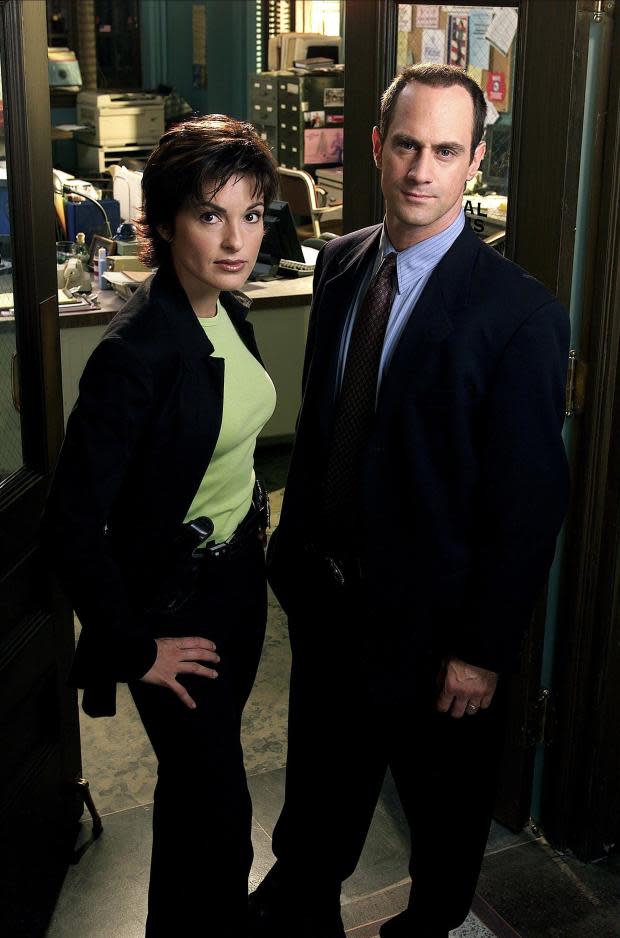
NBC
Elliot Stabler and Olivia Benson (Christopher Meloni and Mariska Hargitay)
Law & Order: SVU (1999-2011; 1999-, NBC); Law & Order: Organized Crime (2022-)
Signature styles: You know by now! He’s a tough guy who menaces with his fierce gaze; she’s an empathetic crime-solver who leads with her heart. Together, these NYC stalwarts have arrested hundreds of violent sex offenders dating back to the last century.
Why they rank: “They’re equal partners in every sense and they have mutual respect for each other,” Roush says. But unlike the rest of the paired-up detectives in the venerable Law & Order universe, they also shine because of their crackling sexual chemistry: “We’re still watching every piece of body language because we want them to fall in bed together so badly. But in the [creator] Dick Wolf world, you don’t just play that game.”
Sleuth truth: Though the Emmy-winning Hargitay, 59, stars in TV’s longest-running drama series (sorry, Gunsmoke fans!), she’s still learning about the law-enforcement system. As she told Parade in 2019, “Every week I get a research packet sent to me so I can learn how to become a better detective.” That’s why she loves to barricade herself in her cozy dressing room decorated in soft colors and personal mementoes: “I’d be lying if I said it isn’t difficult to be inundated with the material. It’s still a difficult world for me.” (NBC, Thursdays; streaming on Peacock)
Related: Adrian Monk Is Coming Back in a Movie: Get the Details
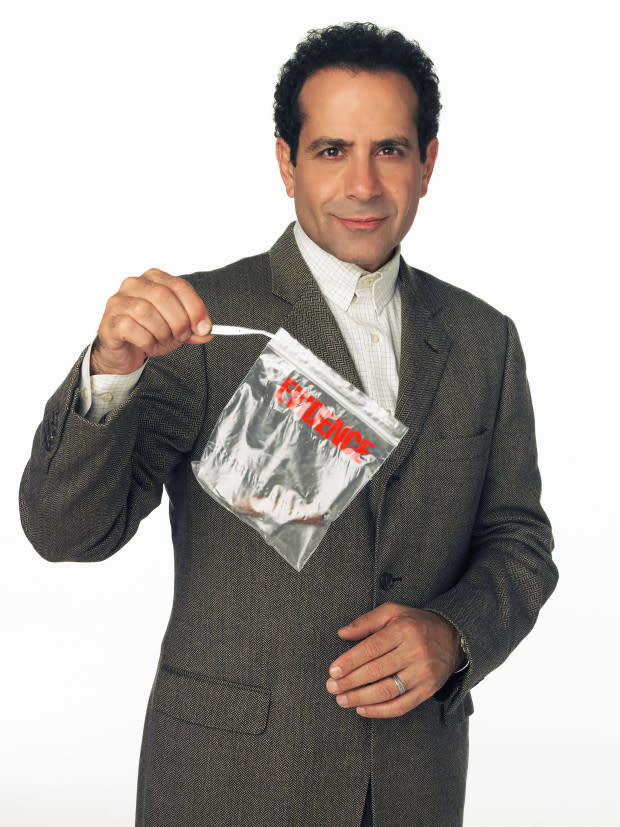
Getty/USA
Adrian Monk (Tony Shalhoub)
Monk (2002-09, USA)
Signature style: Though most cops are obsessive, the San Francisco “defective detective” pushed things to extremes. A self-admitted awkward and shy germophobe and agoraphobe, Monk was a genius because he used his compulsions to spot the minuscule details we all missed. (He even once made a note of the way a pen rolled off a table!)
Why he ranks: “There aren’t a lot of funny cops unless you’re doing a true comedy,” Roush says. “This guy was warm and endearing and made you laugh. You just wanted to give him a hug, even though that’s the last thing he wanted.”
Sleuth truth: Monk was originally pitched to ABC as a bumbling Inspector Clouseau-like detective with Michael Richards—the bumbling Kramer on Seinfeld, of course—attached to the role. After Richards backed out, ABC passed and USA picked it up. (Ironically, Shalhoub, now 69, had auditioned to play Jason Alexander’s George Costanza for the sitcom in the 1980s.) Shalhoub ended up nabbing three Emmys for his work. Says Roush, “Tony brought genuine humor and humanity to the role.” (Streaming on Peacock and Amazon Prime)
Next, We Ranked the 101 Best Thrillers of All Time, From 'Psycho' to 'Parasite'